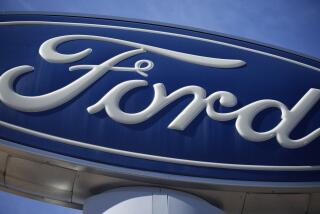Ford Planning to Boost SUVs’ Fuel Economy
- Share via
Ford Motor Co., which has helped popularize gas-guzzling sport-utility vehicles, is expected to announce today that it will increase the average fuel economy of its SUV fleet by 25% over the next five years.
A Ford insider said Wednesday that Jacques Nasser, the company’s chief executive, will make a “major fuel economy announcement” at a news conference in Washington this morning.
Ford, which sells about 800,000 sport-utility vehicles a year--ranging from the four-passenger, 3,000-pound Explorer Sport to the eight-passenger, 3.5-ton Excursion--has laid claim to being the domestic auto industry’s leader in environmental responsibility and has been stung by criticism of its SUV fleet.
The Excursion, the world’s largest sport utility, averages only 12 miles per gallon, and Ford Chairman William Clay Ford Jr. recently acknowledged that SUVs, while wildly profitable for the auto industry and popular with consumers, come with a number of environmental and safety disadvantages.
Ford already has improved its SUVs’ tailpipe emissions--most get low emission vehicle ratings--in a two-year program that, company officials say, has helped it in the marketplace despite an average cost of about $100 per vehicle.
The new fuel economy plan would increase the average of Ford’s entire SUV fleet by about 5 mpg.
“It’s a great move,” said industry analyst George Peterson, president of AutoPacific Inc. in Tustin. “If they can tell the world that their Excursion is now going to be getting 15 or 16 miles to the gallon by 2005 and that all their other SUVs will be more fuel efficient too, it will give them a tremendous advantage” over General Motors Corp. and DaimlerChrysler’s U.S. operation. Each of the three companies has about 25% of the SUV market, with the remainder divvied up among nearly a dozen Asian and European auto makers.
U.S. fuel economy rules now require auto makers’ light-truck fleets to achieve an average of 20.7 mpg, far below the 27.5-mpg average that the passenger car fleet must meet. SUVs are considered light trucks, and because they are heavier than most pickups and minivans, they typically have the worst fuel economy of the bunch.
Still, Americans bought almost 4 million SUVs last year--about 1 of 5 cars and light trucks sold.
And while recent jumps in gasoline prices in the U.S. have focused attention on SUVs’ low mileage, most analysts--and most auto industry executives--believe that the national appetite for the versatile and often luxuriously outfitted trucks is far from sated.
Indeed, Ford is bringing out several new SUVs, including the Explorer Sport Trac, which mates an Explorer cabin with a short pickup bed--and the Escape, a crossover model that utilizes car-like uni-body construction and independent suspension for a smooth ride and improved efficiency.
The four-cylinder version of the Escape is rated at up to 28 mpg on the highway, and the V6 model will get about 20 mpg.
Mileage figures such as those will help Nasser and his troops achieve the ambitious SUV fuel economy goal, but Ford also will have to pump up the efficiency of its larger models.
Like all auto makers, Ford has been working toward that goal for some time, experimenting with engine tuning and with lighter body and engine parts made of materials such as composite plastics and aluminum.
The trick will be to improve fuel economy without sacrificing performance. “Our research shows that SUV drivers value acceleration and are willing to give up mileage for performance,” Peterson said.






